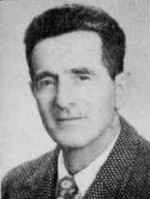 |
|
|
[Page 481]
By Aron Shron, Israel
Translated by Tina Lunson
|
|
The Yotse Goworowo Organization in Israel began its activities as soon as the first emigre groups from the surviving remnant after the great world-destruction, began arriving. Before the First World War, there were only a small number of Goworowo Jews in the land, who were spread over various settlements, from Rehovot to Kfar Ata and in kibutsim. They kept in contact with one another but rarely met all together.
When the terrible reports about the destruction of Jews in Poland began to arrive, we wanted to do something, at least to know about the fate of friends and acquaintances. Our efforts did not bring any results. After some time we learned a few addresses of Goworowo deportees in Siberia. We began organizing the shipping of packages to the relatives.
At the end of 1948 the first of those rescued from the Holocaust arrived in the land. We tried to help each one with whatever we could. There were members living in one-room residences who took in whole families and lived together until they had adapted a little to the land.
Khane Rokhl Kuperman developed an aid organization in America. She sent a large number of food packages for the new immigrants, and we distributed them here according to the list included in the shipment. For the holidays, help also arrived from the Goworowo landsmanshaft in America – “Children of Aron Shleyme Tehililm” – of which her husband Borekh Kuperman of blessed memory was the head.
In 1949 there were already a large number of Goworowo Jews in Israel.
[Page 482]
What was needed now was an effective organization with an elected board of directors that could carry on the work. During the interim days of Passover of 1949, in the residence of Yekl Gurka and Avrom Romaner in Yafo, the first founding meeting took place. The following board was elected: Aron Shron, Avrom Holtsman, Tsipore Kliborski, Avrom Zakharihu and Yehude Gurka. At the assembly, a financial campaign was made, and a certain sum of money was gathered to help the needy refugees.
In time the refugee families gradually settled in. People started to think about how to eternalize the memory of the victims and of the ruined shtetl . The 7th of Elul was designated as the memorial day, as that was the day when the first victim fell.
|
|
The first memorial day took place on the 7th of Elul that same year, in the venue of the “Beyt ha'khalutsot” in Tel Aviv. All of the Goworowo Survivors in the land took part. After the memorial prayers, plans were discussed about how to help the needy and create ties with the foreign landsmanshaftn and with individuals. Since then, a memorial service is held each year on that date, with the participation of a cantor and speakers. Rov Meyshe Bernshteyn often refers to the subjects of that day.
Over a few years, as more Goworowo families came into the land, the connections grew stronger and the council stayed in touch with everyone. New people were elected to the board and today it is composed of the following members: Aron Shron, Chairman, Avrom Levin, Avieyzer
[Page 483]
Burshtin, Berl Kosovski, Yosef Grudka, Yosef Zilbertson, Meyshe Sarne, Khave Bernshteyn, Naftali Shmelts, Yehude Gurka, Meyshe Dronitsa, Meyshe Granat and Avrom Holtsman.
In 1955 the organization founded an interest-free loan society, thanks to our landsman Meyshe Levin and his wife Sore, from Cuba. They visited Israel then and offered a large sum of money as ground capital and thus the fund is named for their son Tsvi of blessed memory, who died young. The council also raised money for that goal from members and friends in Israel, from our tourists and from other sources.
In the last ten years a large number of Goworowo landsmen have visited Israel and for many of them the council made celebratory receptions. Coming from America: Avrom Kalman Blumshteyn, Sore and Yitskhak Blumshteyn, Sore Fridman, Libe Nadboy-Proske, Niske Koen, Ester and Note Tenenboym, Mariyam Blumshteyn-Papiertshik, the family Mozes, Simkhe Farba, Avrom Kshonzshka, Mayer Koen, Feyge Sheyniak, and others. From Canada: Rifke and Shmuel Rozenberg, Shmuel Shetsik and wife, Shtshetshina, Sore Israel-Grinberg, Libe Doytsh-Gemora, and others. From Belgium: Zelig Reytshik and family, From Colombia: Frume Tsuker-Vaysbord, Khane Vaysbord with her daughter and her husband. From Uruguay: Roman Beyle. From Argentina: Avrom Shvartsberd. From Australia: Yekhezkel Tehilim. From Germany: Berl and Yosef Kshanzshka. Most of all these guests gave money for the interest-free loan society and for the organization itself.
|
|
[Page 484]
|
|
Second row: Avrom Holtsman, Yehude Grudka, Rov Avieyzer Burshtin, Berl Kosovski and Aron Shron |
In 1960 the organization installed a marble tablet in the “Holocaust Celler” on Mount Zion in Jerusalem, in memory of our destroyed shtetl Goworowo. For the World Congress of Polish Jews, which took place in Israel in 1961, the “United Polish Refugees” published a book titled Landsmanshaftn in Israel. Our organization supported the book and wrote a long article for it, with pictures of its activities and a general overview of Goworowo.
During all the days of remembrance and at other gatherings, people always spoke of the importance of publishing a yisker-bukh , according to the example of other shtet and shtetlekh in Poland. But the colossal difficulty and the huge financial costs that were associated with that, stopped our carrying out the plan for a long time. Only in 1959, when our friends Rivke and Yisroel Rozenberg from Canada visited Israel for the first time, was the matter given a push forward. During a reception that was arranged in their honor at the home of the writer of these lines, people spoke about the great importance of a book of remembrance for our shtetl and the hard problems that stood in the way of realizing that. The guests promised us the necessary help, and right after their return to Canada they indeed began their work. Rivke Rozenberg traveled down to New York specially for this and aroused the Goworowo Jews to the task. Active in this were the members Sore and Yitskhak Blumshteyn, Yitskhak Shafran, Yitskhak Dovid Tehilim, Naftali Kuperman and others. All of these collected and sent money for the book. Avrom Kalman Blumshteyn was also among the first participants in the action. Here in Israel people also make the effort and we soon entered into the actual work.
[Page 485]
The first meeting of the editorial board took place in Kfar Sitron, at Rov Avieyzer Burshtin's, and intensive and real work quickly began. Hundreds of circulars and letters were sent out to landsmen in Israel and in other countries, and to several institutions. Dozens of meetings took place in the homes of Berl Kosovski, Yosl Gurka, Khave Bernshteyn and Avrom Holtsman. More Goworowo Jews were invited to become members: Yankev Gurka, Naftali Shmelts and among the local Polish landsmanshaftn. Contact was maintained with each Goworower individually, until the book was finally readied.
|
|
The organization considered it an obligation to note with honor and thanks the members Rov Avieyzer Burshtin and Berl Kosovski, who dedicated enormous energies to write, edit and publish the book, without seeking any reward. There is absolutely no doubt that without them the book would not have been published. Just to edit such a book in Israel today would cost ten to fifteen thousand Israeli pounds, and we had only about half of that, and that had to pay for paper, printing, engraving, binding and other expenses that were involved. Many members helped at the beginning of the work, like Yosef Gurka and Avrom Holtsman. The writer of these lines was active the whole time and helped at every opportunity.
There is no doubt that the yisker-bukh was the crowning achievement of the organization, but the organization has other important goals for the future. We strive to be able to have our own apartment in Tel Aviv, from which all the activities of the organization could be conducted: the secretariat, the interest-free loan fund, a hall for meetings and a prayer room. When that plan is realized, we can trust that we have done all we can to reunite our beloved, ruined, shtetl Goworowo.
by Avrom Levin, Israel
Translated by Tina Lunson
The interest-free loan society of the Yotse Goworowo Organization in Israel was founded in 1955. It happened during a visit in Israel by my children Meyshe and Sore Levin from Cuba. At the time, I held a meeting in my home with good friends from Goworowo, in which we spoke from our hearts. My son Meyshe told them of the great misfortune that he met with the death of his twelve-year-old son, my grandson Tsvi of blessed memory, and he stated that he was prepared to financially support some kind of mitsve in the memory of his lost child. Rov Meyshe Bernshteyn proposed an interest-free loan fund in his name. The plan was promptly accepted. My son Meyshe contributed 500 Israeli pounds, and a few months later he sent another 100 pounds. This was the foundation of the Goworowo interest-free loan fund.
Later we also made a money collection among the Goworowo Jews in Israel. Each one contributed, some more, some less, and we received another 400 pounds. During my visit to Cuba in 1965, for the wedding of my grandson, I collected another 450 pounds from friends and acquaintances; and on my son Meyshe's second visit to Israel in 1958, he gifted it with another 350 pounds.
|
|
[Page 487]
|
|
|
There were more gifts and contributions from friends and acquaintances until today the fund holds 4,000 Israeli pounds.
The fund serves the Goworowo Jews. Whoever needs a loan of a few hundred pounds can receive the proceeds and pay it back in monthly payments.
Last year, 1965, the fund loaned out 5,500 Israeli pounds to 21 persons, for necessary and productive uses.
The work of the interest-free loan fund gives us great satisfaction because we can help a person in a needy situation. The mitsve of gemiles-khesed stands above charity, because charity is only for poor people and gemiles-khesed – is both for the wealthy and for the poor. We say it every day while praying: “and gemiles-khesed”; and the Mishna adds “The following are the things for which a man enjoys the fruits in this world while the principal remains for him in the world to come.” [Mishnah Peah 1:1]. It is therefore a greater pleasure when a Jews asks for a loan and one can give it to him.
by Yitskhak Safran, Israel
Translated by Tina Lunson
Jewish America is famous for its landsmanshaftn. Almost every city and townlet in Europe has its “society” or community in America. Every Jew who came to America ten years ago quickly felt that “He might make thee know that man doth not live by bread only. [Deuteronomy 8:3] ” and that he would not exist just for making money. He also had a spiritual life, and a spiritual life cannot be only individuals, but when one is organized in a community.
In order to grasp the concept of what was called “making money” then, and how those “societies” were developed, we must turn back 60 or 70 years. And what was handed to our older landslayt:
“Normal” work hours then were between 60 and 70 hours a week, A [sewing] machine operator had to carry his own machine on his shoulders. After a hard day's work and after eating a cheap supper in a cellar restaurant, he began a new order of night work and extra hours.
One who worked until midnight received a nickel, five cents. That nickel back then had great value, one could get bread with herring and a glass of beer for it. But what did a Goworowo Jews who left a wife and children in the old country do? Better to save that nickel. He thought to himself:
|
|
“Children of Aron Shleyme Tehilim for People from Goworowo” |
[Page 489]
“I already ate supper, it's not long now until breakfast, it's better to save it for the family.” As for sleeping, they slept in a cellar on an upright bed for fifty cents a month, and that was not alone but along with another dozen landslayt.
One became so accustomed to saving, they could not stop saving… time for community activity. People organized, and the older landslayt helped the Newcomers, and work was more than enough. Almost every “greenhorn” needed some help – if not material help, then a kind work, some advice, encouragement, and the like. And they did not forget to share the last meal of the sabbath, to usher out the Shabes Queen, to study something, and so on. Consequently, the “societies” grew like mushrooms after a rain, and their activity was of the first degree of importance.
|
|
Our shtetl Goworowo has to this day two “societies”, an old one and a new one. The old has already existed here for 70 years. It is called in short “the old association” but the correct name is “Children of Aron Shleyme Tehilim for People from Goworowo”. From its first pioneering founding we only know the name of Mendl Shults, Yisroel Yitskhak Vishnie, Khayim Dovid Fridman and Khone the kasha-maker. In the 1930s, when Borekh Kuperman of blessed memory came to America, he quickly became active in the leadership of the association. He was for many years the gabay of the Burial society and maintained that activity until his own passing. His wife Khane Rokhl may her days be long, is today also leader of the “Ladies Auxiliary”.
The Association has its own shul for praying and studying and its own cemetery. The Association was once very active. Once a year they celebrated a big Burial Society feast, as in the old home. Several times a year there were smaller feasts. At all of these occasions money was always collected for charity, the goal being to help the neediest landslayt in Goworowo.
[Page 490]
|
|
But there was also a younger audience, among them many unmarried men, who did not want to be harnessed to the older association which only gave them the shul to pray in and sometimes, at the end of Shabes, the last meal. The young folk wanted a more modern communal work. Instead of a Shabes feast, they wanted a modern banquet with music, and other things. That brought about the younger people making Shabes on their own and in 1909 the founded their own association under the name “Goworowo Young Men's Society”.
In praise of both the “societies” it must be said that thanks to the American democratic spirit, through all those 60 years of existence, there were no conflicts between the two landsmanshaftn. Many Goworower belonged to both “societies”. The chief task of both associations was to make it possible for all Goworower to maintain together, not be lonely, and to help one another when in need.
Among the founders and active members of the “Young Men's” it is worthwhile to mention Binyumin Aleirazsh, Louis Ashur, Yosef Burshtin and Meyshe Miller all of blessed memory; and may they live a good life Kalman Toyz, Yankev Bresler, Harry Nadel, Berish Granat, Sam Levin, Yankev Ribitsh, Max Kahn, and the brother Tehilim.
The “Young Men's” were active all their years in general communal areas. They consistently supported the “Joint Distribution Committee”, “HIAS” and others. Still today they give large sums annually to the “United Jewish Appeal”. The “society”, as well as the old association and many other landsmanshaftn in America, have their own cemetery. The “Young Men's” also involves a lot to help the lives of their members. So, for example, they have an aid fund for the ill. When a member becomes heaven forbid sick and cannot work, he receives a weekly stipend of 15 dollars.
[Page 491]
When Goworowo was still Goworowo, the tow “societies” had a partnering relief committee and together sent the aid to Goworowo. We all remember well what was done in the shtetl, especially before Passover, regarding making the list of the poor people. Each person was judged according to his situation and importance. Of course, there were complaints about who got more and who got less. Many letters arrive in America with complaints, pleas and explanations from the town. The American committee had to make everything equal. It was a difficult piece of work with many arguments. The Goworower woman Khaye Sore Zeydler must be specially noted, as she gave large sums of money for the construction of the new study-house.
After the great destruction of World War II, the relief committee was very active in sending packages and money to the Goworowo survivors, wherever they were. Tod this day we are still conducting productive work, but now not in the same volume as before. Until World War II there were always new landslayt coming to America, who were taken into the “societies” with great honor and helped in every way possible. With the last world war, when the Germans may their names be blotted out, made a ruin of our town, the stream of new immigrants has almost completely stopped. There is no special Goworowo problem, but a general one of all Jewish “societies” in America that are gradually shrinking, and with without alternatives limit their activities. The “Young Men's” today has no more than 150 families, and the old association, even fewer. But they work beyond their capabilities, in order maintain their existence.
The activists in today's “Young Men's” are Yankev Zemlovitsh, Chairman; Sam Epshteyn, Financial Secretary; Harry Miller, Recording Secretary; Yosef Bresler, Treasurer; Harry Berliner, Meyshe Izdoba and Yitskhak Dovid Tehilim. Trustees. Yitskhak Dovid Tehilim is also Chairman of the executive Board.
The activists in the old Association are Naftali Kuperman, President; Meyshe Dan, Vice President; Borekh Markovitsh, Trustee and Yankev Mozes, Recording Secretary.
|
|
Help Committee in Goworowo List of those needing help Remarks Occupation Children Family Name Name Number |
[Page 492]
by A. Ben-Mi'ir, Canada
Translated by Tina Lunson
The Goworowo landsmanshaft in Canada cannot be noted for its long years of history. In sum, most Goworowo families settled in Canada only after World War II. It took several years until they arranged a base from the financial standpoint and found a language with the strange new world. Of course, in the “green” years of adjustment into the new framework, they could not think about any kind of social work.
Sometimes one would meet a few landslayt at celebrations, at festive opportunities, or a temporary visit, but were still far from any organizing.
The first official meeting took place the 27th,/sup> of November 1960, in the home of Leyb Gurman, after Rivke and Shmuel Rozenberg returned from a visit in Israel. Some 40 people attended that meeting. Shmuel and Rivke Rozenberg presented a report about the Goworowo Jews in Israel and stressed the importance of publishing the planned yisker-bukh that would be an eternal monument for our shtetl Goworowo. Other speakers brought out memories of the former life and underlined the need for keeping in close contact with the Goworowo Jews across the whole world. The landsmanshaft in Canada was founded at that very meeting, and the following committee was elected: Rivke Rozenberg, President; Avrom Romaner, Secretary; Berl Leyb Girman, Treasurer; Leyb Gemora, Godl Teler, Hersh Zamek, Mayer Shmelts, Yisroel Shafran, Yisroel Shtetin, and Shmuel Rozenberg.
One of the first assignments of the committee was to seek resources for publishing the yisker-bukh. To that end they took on the task of activating the New York landslayt. Rivke Rozenberg traveled to New York especially for that. She placed announcements in the two Yiddish newspapers – “Forverts” and “Tog Morgn-Zshurnal
” – calling for a meeting of the Goworowo Jews in New York. That effort brought results. A large sum of money was raised. Kalman Blumshteyn donated a golden women's watch, and just like in the olden days we sold raffle tickets and designated that income for the book.
The Canada landslayt come together often until this day, in the home of the Rozenberg family. They deal with
[Page 493]
questions that are just local matters, and everything that has to do with our ties to the other landslayt in all the other countries. Participating in one of the recent meetings were two Goworowo brothers – Yankev and Yitskhak Brik from Montevideo, Uruguay.
They also plan to organize for and establish a landsmanshaft there.
As one can see from this story, the yisker-bukh was the thrust and the foundation on which the founding the landsmanshaft in Canada was based.
Translated by Tina Lunson
Besides the three countries of Israel, America and Canada where there are large concentrations of Goworowo Jews, our landslayt are distributed throughout a number of countries across the whole world, in which there are found solitary and several families.
There are still several families in Russia from World War I. Goworowo families are also located in Uruguay, Brazil, Colombia, Australia, Argentina and Cuba. After the Second World War single families emigrated to Belgium, France, Italy, Poland and West Germany. It is also possible that individual families and persons who stem from Goworowo are to be found in other countries.
In the countries mentioned above, our landslayt do not direct any community activities. They meet seldom, mostly at happy occasions. The Goworowo thread binds them all together though. People stay in letter contact for many years and by visits to the countries where are others, each holding to his duty to visit a landsman, to talk a little about the past and exchange memories.
[Page 494]
Translated by Mira Eckhaus
Edited by Tina Lunson
He immigrated to Israel in 1949, founded and managed the “Talpiot” institution for immigrating youth in Jerusalem. Now he is the director of a “Torah U'molacha” [Torah and Craft] yeshive, a vocational high school, in Kfar Tsvi Citrin, near Haifa.
In Israel, his following books were published: Morey Deya, Gdoley Deya, Adirey Dea – Encyclopedia for the Greats of Israel (Zioni Publishing House), and Righteousness of the Wise (Ohel Publishing House).
After the liberation, he served as a member of the Central Committee for Liberated Jews in the British occupied area of Germany, a member of the Revisionist Zionist Alliance Center and the headquarters of the Betar district, Bergen Belsen. There he also edited the monthly newspapers: “Der Emes”, “Unzer Fraynt” and participated in “Vokhenblat” (Bergen Belsen), “Unzer Velt” (Munich) and other newspapers of the survivors of the Holocaust. He is the author of the Bibliography of the Jewish publications in the British occupied area of Germany, 1945-1950.
Our above-mentioned friends initiated the publication of this book, toiled, labored, and encouraged others to write, collected material and photos from various sources, and from scraps of rumors and testimonies erected an eternal tombstone to our hometown Goworowo. For this they will be blessed.
We also express our hearty gratitude to our friends Yosef Gurka, Meyshe Granat, Avraham Holtsman and others, who participated in articles and essays that added greatly to the content of the book.
Translated by Tina Lunson
Mrs. Rivka and Shmuel Rozenberg of Monreal, Canada,
Avrom Kalman Blumshteyn
And all our friends from Israel and other lands who supported
Everyone – a hearty congratulation – may your strength only grow!
Council of the Yotsey Goworowo Organization in Israel
JewishGen, Inc. makes no representations regarding the accuracy of
the translation. The reader may wish to refer to the original material
for verification.
Copyright © 1999-2025 by JewishGen, Inc.
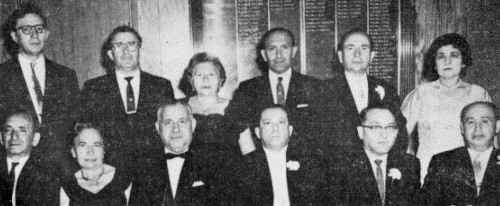
Standing: Rokhl Gurman, Yisroel Shafran, Hershl Zamek, Etl Teler, Mayer Shmelts and Shmuel Shtetin
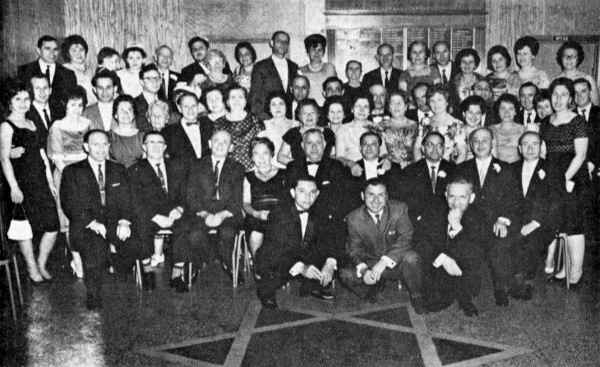
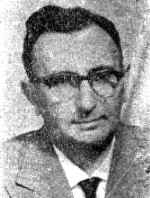
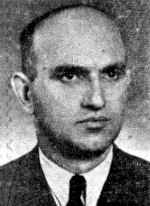
the first who properly valued the importance of the “yisker-bukh”.
Sore and Yitskhak Blumshteyn
Yitskhak Dovid Tehilim of the “young Men's”
Naftali Kuperman of the “Society of the Children of Shleyme Tehilim”
Yitskhak Shafran, of America
and made possible the publication of this Seyfer Yisker.
fulfilling our
mission of disseminating information about the Holocaust and
destroyed Jewish communities.
This material may not be copied,
sold or bartered without JewishGen, Inc.'s permission. Rights may be
reserved by the copyright holder.
JewishGen is not responsible for inaccuracies or omissions in the original work and cannot rewrite or edit the text to correct inaccuracies and/or omissions.
Our mission is to produce a translation of the original work and we cannot verify the accuracy of statements or alter facts cited.
 Goworowo, Poland
Goworowo, Poland
 Yizkor Book Project
Yizkor Book Project
 JewishGen Home Page
JewishGen Home Page
Yizkor Book Director, Lance Ackerfeld
This web page created by Jason Hallgarten
Updated 15 Jan 2025 by LA